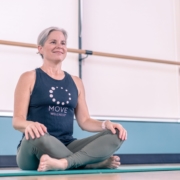Why Health Isn’t the Goal We Think It Is
One U of M professor’s powerful work on motivation and exercise
Simply put, Dr. Segar writes “Logic doesn’t motivate us. Emotions do.” The psychology behind exercise, and why some people stick with it long after PT while others drop off is explained by a powerful reward system that has been a focus of University of Michigan researcher Dr. Michelle Segar’s work and book No Sweat: How the Simple Science of Motivation Can Bring You a Lifetime of Fitness
Dr. Segar’s work suggests that the goal to be healthy may be adequate to initiate a behavior but not to sustain it because people do the things that gives them the most immediate benefit. Better health is hard to notice immediately. This “larger, distant reward” (2015) isn’t as fueling as immediate rewards such as more energy, an endorphin high, mood boost, alertness, etc.
People don’t necessarily want to be healthy, they want the things that health affords them – “good health is only valuable because it helps us live our daily lives well,” she notes in the Journal of American Society on Aging. So where do we go from here?
What’s the right goal?
Motivation is unique to each individual but Dr. Segar suggests that as health and fitness specialists, we rebrand health as well-being because when individuals are motivated to feel better, they engage in self-care behaviors that immediately give them rewards.
Sustainable self-care behaviors are made up of multiple decisions every day. Research shows that people often don’t do what is in their best interest, and that willpower depletes with use (Ariely, 2009; Vohs and Heatherton, 2009)…To better motivate consistent decisions that favor self-care and health, it is helpful for people to notice immediate, experiential rewards, which can be tied to well-being and enhance the areas of life that are most meaningful. Consider these as better reasons, or Whys, for creating sustainable behavior. (Segar, 2015).
As professionals we know that consistency and frequency, or cadence, is the best way to make lasting behavior changes. At MOVE Wellness, our clients tell us how they never thought they would be able to commit to an exercise program, but they soon love how they feel and they are in 100 percent.
If you’ve been contemplating your goals and creating sustainable behavior change, come in and talk to us! Email elaine@movewellness.com and introduce yourself.
Source: Segar, Michelle. (2015). The Right Why: The Surprising Start to Cultivating Sustainable Behavior Change. Journal of the American Society on Aging. Vol. 39(1).









Leave a Reply
Want to join the discussion?Feel free to contribute!